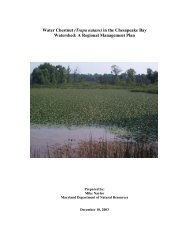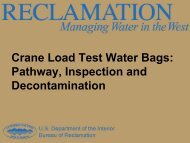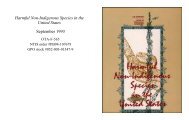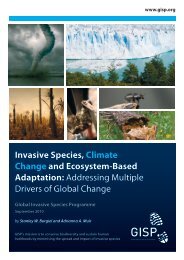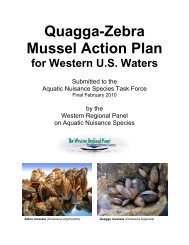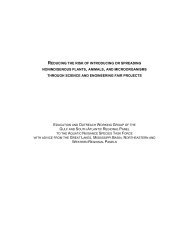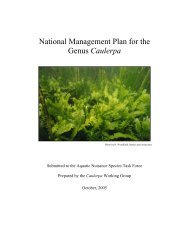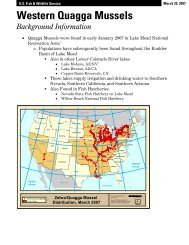- Page 1 and 2:
page i BIOLOGICAL INVASIONS OF COLD
- Page 3 and 4:
page iii • Stephan Benda, Valdez
- Page 5 and 6:
page v • From an industry and man
- Page 7 and 8:
page vii • The magnitude of seaso
- Page 9 and 10:
page ix • The voyage duration of
- Page 11 and 12:
page xi microscopes for the study.
- Page 13 and 14:
page xiii 9C9. Echinoderms 9C9-1 9C
- Page 15 and 16:
Chapt 1. Introduction, page 1- 2 pa
- Page 17 and 18:
Chapt 1. Introduction, page 1- 4 co
- Page 19 and 20:
Chapt 1. Introduction, page 1- 6 79
- Page 21 and 22:
Chapt 1. Introduction, page 1- 8 pr
- Page 23 and 24:
Chapt 1. Introduction, page 1- 10 R
- Page 25 and 26:
Chapt 2. Ballast Water Delivery Pat
- Page 27 and 28:
Chapt 2. Ballast Water Delivery Pat
- Page 29 and 30:
Chapt 2. Ballast Water Delivery Pat
- Page 31 and 32:
Chapt 2. Ballast Water Delivery Pat
- Page 33 and 34:
Chapt 3. Biological Characteristics
- Page 35 and 36:
Chapt 3. Biological Characteristics
- Page 37 and 38:
Chapt 3. Biological Characteristics
- Page 39 and 40:
Chapt 3. Biological Characteristics
- Page 41 and 42:
Chapt 3. Biological Characteristics
- Page 43 and 44:
Chapt 3. Biological Characteristics
- Page 45 and 46:
Chapt 3. Biological Characteristics
- Page 47 and 48:
Chapt 3. Biological Characteristics
- Page 49 and 50:
Chapt 3. Biological Characteristics
- Page 51 and 52:
Chapt 3. Biological Characteristics
- Page 53 and 54:
Chapt 3. Biological Characteristics
- Page 55 and 56:
Chapt 3. Biological Characteristics
- Page 57 and 58:
Chapt 3. Biological Characteristics
- Page 59 and 60:
Chapt 4. Predicting Initial Surviva
- Page 61 and 62:
Chapt 4. Predicting Initial Surviva
- Page 63 and 64:
Chapt 4. Predicting Initial Surviva
- Page 65 and 66:
Chapt 5 Ballast Water Exchange Expe
- Page 67 and 68:
Chapt 5 Ballast Water Exchange Expe
- Page 69 and 70:
Chapt 5 Ballast Water Exchange Expe
- Page 71 and 72:
Chapt 5 Ballast Water Exchange Expe
- Page 73 and 74:
Chapt 6. Organisms in Sediments of
- Page 75 and 76:
Chapt 6. Organisms in Sediments of
- Page 77 and 78:
Chapt 7. Organisms Fouling Hulls an
- Page 79 and 80:
Chapt. 8. Summary of NIS, page 8- 1
- Page 81 and 82:
Chapt. 8. Summary of NIS, page 8- 3
- Page 83 and 84:
Chapt. 8. Summary of NIS, page 8- 5
- Page 85 and 86:
Chapt. 8. Summary of NIS, page 8- 7
- Page 87 and 88:
Chapt. 8. Summary of NIS, page 8- 9
- Page 89 and 90:
Chapt. 8. Summary of NIS, page 8- 1
- Page 91 and 92:
Chapt. 8. Summary of NIS, page 8- 1
- Page 93 and 94:
Chapt. 8. Summary of NIS, page 8- 1
- Page 95 and 96:
Chapt. 8. Summary of NIS, page 8- 1
- Page 97 and 98:
Chapt. 8. Summary of NIS, page 8- 1
- Page 99 and 100:
Chapt. 8. Summary of NIS, page 8- 2
- Page 101 and 102:
Chapt. 8. Summary of NIS, page 8- 2
- Page 103 and 104:
Chapt. 8. Summary of NIS, page 8- 2
- Page 105 and 106:
Chapt 9A. Overview of NIS Surveys,
- Page 107 and 108:
Chapt 9A. Overview of NIS Surveys,
- Page 109 and 110:
Chapt 9A. Overview of NIS Surveys,
- Page 111 and 112:
Chapt 9A. Overview of NIS Surveys,
- Page 113 and 114:
Chapt 9B. NIS Surveys: Rapid Commun
- Page 115 and 116:
Chapt 9C1. Marine Plants, page 9C1-
- Page 117 and 118:
Chapt 9C1. Marine Plants, page 9C1-
- Page 119 and 120:
Chapt 9C1. Marine Plants, page 9C1-
- Page 121 and 122:
Chapt 9C1. Marine Plants, page 9C1-
- Page 123 and 124:
Chapt 9C1. Marine Plants, page 9C1-
- Page 125 and 126:
Chapt 9C1. Marine Plants, page 9C1-
- Page 127 and 128:
Chapt 9C1. Marine Plants, page 9C1-
- Page 129 and 130:
Chapt 9C1. Marine Plants, page 9C1-
- Page 131 and 132:
Chapt 9C1. Marine Plants, page 9C1-
- Page 133 and 134:
Chapt 9C1. Marine Plants, page 9C1-
- Page 135 and 136:
Chapt 9C1. Marine Plants, page 9C1-
- Page 137 and 138:
Chapt 9C1. Marine Plants, page 9C1-
- Page 139 and 140:
Chapt 9C1. Marine Plants, page 9C1-
- Page 141 and 142:
Chapt 9C1. Marine Plants, page 9C1-
- Page 143 and 144:
Chapt 9C2. Planktonic Cnidaria, Cte
- Page 145 and 146:
Chapt 9C2. Planktonic Cnidaria, Cte
- Page 147 and 148:
Chapt 9C2. Planktonic Cnidaria, Cte
- Page 149 and 150:
Chapt 9C2. Planktonic Cnidaria, Cte
- Page 151 and 152:
Chapt 9C2. Planktonic Cnidaria, Cte
- Page 153 and 154:
Chapt 9C2. Planktonic Cnidaria, Cte
- Page 155 and 156:
Chapt 9C2. Planktonic Cnidaria, Cte
- Page 157 and 158:
Chapt 9C3. Polychaete Worms, page 9
- Page 159 and 160:
Chapt 9C3. Polychaete Worms, page 9
- Page 161 and 162:
Chapt 9C3. Polychaete Worms, page 9
- Page 163 and 164:
Chapt 9C3. Polychaete Worms, page 9
- Page 165 and 166:
Chapt 9C3. Polychaete Worms, page 9
- Page 167 and 168:
Chapt 9C3. Polychaete Worms, page 9
- Page 169 and 170:
Chapt 9C3. Polychaete Worms, page 9
- Page 171 and 172:
Chapt 9C3. Polychaete Worms, page 9
- Page 173 and 174:
Chapt 9C4. Peracaridan Crustaceans,
- Page 175 and 176: Chapt 9C4. Peracaridan Crustaceans,
- Page 177 and 178: Chapt 9C4. Peracaridan Crustaceans,
- Page 179 and 180: Chapt 9C4. Peracaridan Crustaceans,
- Page 181 and 182: Chapt 9C4. Peracaridan Crustaceans,
- Page 183 and 184: Chapt 9C4. Peracaridan Crustaceans,
- Page 185 and 186: Chapt 9C4. Peracaridan Crustaceans,
- Page 187 and 188: Chapt 9C4. Peracaridan Crustaceans,
- Page 189 and 190: Chapt 9C4. Peracaridan Crustaceans,
- Page 191 and 192: Chapt 9C4. Peracaridan Crustaceans,
- Page 193 and 194: Chapt 9C4. Peracaridan Crustaceans,
- Page 195 and 196: Chapt 9C4. Peracaridan Crustaceans,
- Page 197 and 198: Chapt 9C4. Peracaridan Crustaceans,
- Page 199 and 200: Chapt 9C4. Peracaridan Crustaceans,
- Page 201 and 202: Chapt 9C4. Peracaridan Crustaceans,
- Page 203 and 204: Chapt 9C4. Peracaridan Crustaceans,
- Page 205 and 206: Appendix Table 9C4.5. Continued Cha
- Page 207 and 208: Appendix Table 9C4.7. UAF unidentif
- Page 209 and 210: Chapt 9C4. Peracaridan Crustaceans,
- Page 211 and 212: Chapt 9C4. Peracaridan Crustaceans,
- Page 213 and 214: Chapt 9C4. Peracaridan Crustaceans,
- Page 215 and 216: Chapt 9C4. Peracaridan Crustaceans,
- Page 217 and 218: Chapt 9C4. Peracaridan Crustaceans,
- Page 219 and 220: Chapt 9C4. Peracaridan Crustaceans,
- Page 221 and 222: Chapt 9C5. Copepod Crustaceans, pag
- Page 223 and 224: Chapt 9C5. Copepod Crustaceans, pag
- Page 225: Chapt 9C5. Copepod Crustaceans, pag
- Page 229 and 230: Chapt 9C6 Decapod Crustaceans, page
- Page 231 and 232: Chapt 9C7. Shelled Molluscs, page 9
- Page 233 and 234: Chapt 9C7. Shelled Molluscs, page 9
- Page 235 and 236: Chapt 9C7. Shelled Molluscs, page 9
- Page 237 and 238: Chapt 9C7. Shelled Molluscs, page 9
- Page 239 and 240: Chapt 9C7. Shelled Molluscs, page 9
- Page 241 and 242: Chapt 9C8. Opisthobranch Molluscs,
- Page 243 and 244: Chapt 9C8. Opisthobranch Molluscs,
- Page 245 and 246: Chapt 9C8. Opisthobranch Molluscs,
- Page 247 and 248: Chapt 9C8. Opisthobranch Molluscs,
- Page 249 and 250: Chapt 9C9. Echinoderms, page 9C9- 2
- Page 251 and 252: Chapt 9C10. Ascidians, page 9C10- 2
- Page 253 and 254: Chapt 9C10. Ascidians, page 9C10- 4
- Page 255 and 256: Chapt 9C10. Ascidians, page 9C10- 6
- Page 257 and 258: Chapt 9C10. Ascidians, page 9C10- 8
- Page 259 and 260: Chapt 9D. Fouling Community Surveys
- Page 261 and 262: Chapt 9D. Fouling Community Surveys
- Page 263 and 264: Chapt 9D. Fouling Community Surveys
- Page 265 and 266: Chapt 9E. Museum, Reference and Vou
- Page 267 and 268: Chapt 9E. Museum, Reference and Vou
- Page 269 and 270: Chapt 9E. Museum, Reference and Vou
- Page 271 and 272: Chapt 9E. Museum, Reference and Vou
- Page 273 and 274: Chapt 10. Biodiversity, page 10- 2
- Page 275 and 276: Chapt 10. Biodiversity, page 10- 4
- Page 277 and 278:
Chapt 10. Biodiversity, page 10- 6
- Page 279 and 280:
Chapt 10. Biodiversity, page 10- 8
- Page 281 and 282:
Chapt 10. Biodiversity, page 10- 10
- Page 283 and 284:
Chapt 10. Biodiversity, page 10- 12
- Page 285 and 286:
Chapt 10. Biodiversity, page 10- 14
- Page 287 and 288:
Chapt 10. Biodiversity, page 10- 16
- Page 289 and 290:
Chapt 10. Biodiversity, page 10- 18
- Page 291 and 292:
Chapt 10. Biodiversity, page 10- 20
- Page 293 and 294:
Chapt 10. Biodiversity, page 10- 22
- Page 295 and 296:
Chapt 10. Biodiversity, page 10- 24
- Page 297 and 298:
Chapt 10. Biodiversity, page 10- 26
- Page 299 and 300:
Chapt 10. Biodiversity, page 10- 28
- Page 301 and 302:
Chapt 10. Biodiversity, page 10- 30
- Page 303 and 304:
Chapt 10. Biodiversity, page 10- 32
- Page 305 and 306:
Chapt 10. Biodiversity, page 10- 34
- Page 307 and 308:
Chapt 10. Biodiversity, page 10- 36
- Page 309 and 310:
Chapt 10. Biodiversity, page 10- 38
- Page 311 and 312:
Chapt 10. Biodiversity, page 10- 40
- Page 313 and 314:
Chapt 10. Biodiversity, page 10- 42
- Page 315 and 316:
Chapt 10. Biodiversity, page 10- 44
- Page 317 and 318:
Chapt 10. Biodiversity, page 10- 46
- Page 319 and 320:
Chapt 10. Biodiversity, page 10- 48
- Page 321 and 322:
Chapt 10. Biodiversity, page 10- 50
- Page 323 and 324:
Chapt 10. Biodiversity, page 10- 52
- Page 325 and 326:
Chapt 10. Biodiversity, page 10- 54
- Page 327 and 328:
Chapt 10. Biodiversity, page 10- 56
- Page 329 and 330:
Chapt 10. Biodiversity, page 10- 58
- Page 331 and 332:
Chapt 10. Biodiversity, page 10- 60
- Page 333 and 334:
Chapt 10. Biodiversity, page 10- 62
- Page 335 and 336:
Chapt 10. Biodiversity, page 10- 64
- Page 337 and 338:
Chapt 10. Biodiversity, page 10- 66
- Page 339 and 340:
Chapt 10. Biodiversity, page 10- 68



